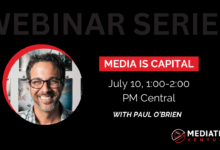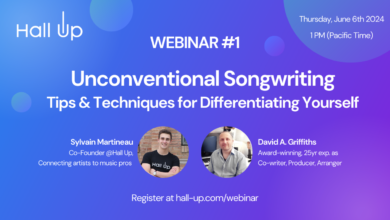
I need not remind that the internet changed everything for musicians, but not entirely in ways for the worse. Never before have musicians had such control over their own future. Namely, because promotion of your band and brand is today, nearly more capably accomplished online, by yourself, than with a label involved.
Having been working on the web since before such a thing was of value to musicians, I’m particularly passionate about keeping tabs on the new technologies and opportunities that enable artists to thrive. For the most part getting started online requires little more than time and an appreciation that your work herein pays off in compounding interest.
I’m going to stop us there as I’m sure you’ve read a dozen of these articles and they all tell you how to use SoundCloud, Facebook, and Instagram. We’re not going there. I want you to think about what you want your approach to promoting your music to be. Based on a tried and true online marketing thesis, think about which of these three philosophies appeals to you most.
How to Promote Your Music
- Be everywhere
- Be viral
- Be analytical
Establish which of those three will dictate how you promote what you’re doing. Think of each of those options as your philosophy; your guiding light. Focus on that which suits you but also that which is appropriate to what your personality.
For example:
- Be everywhere – The Beatles
- Be viral – Miley Cyrus
- Be analytical – Taylor Swift
Now, my examples might not be entirely intuitive since they’re each well known artists (and you may be going, ugh… I don’t want be like so-and-so). Think not of who they are but how that approach to the market relates. The Beatles played everywhere and through merchandising, tours, and more, in fact were everywhere. Miley Cyrus well, perhaps I need not explain. Taylor Swift one could argue is one the modern masters of knowing her audience and evolving to serve that, from kids and Country to adults and Pop.
Now think about some reasonably well known online business and how these philosophies apply:
- Be everywhere – Amazon
- Be viral – Dropbox
- Be analytical – Salesforce
I’m going to presume you get the idea and are familiar with my examples. Each has a guiding principle in online marketing and that principle is both a reflection of what’s appropriate to their platform AND where they excel.
Most bands put up a website and maybe share some photos or a blog post, and give up because content marketing must not work for them, or they promote things on Facebook and cease when it seems no one cares. There is a sophisticated way in which you have to go about using each of those options and the sophistication comes from being cognizant of everything else that factors in to how they work.
Be Everywhere
 This depends up you living this philosophy. Is your music everywhere popular? Is your website indexed by Google? Are pages showing up for every conceivable concept related to what you’re doing? Everything? Are YOU and your bandmates, sound engineer, agent, roadies, and team on LinkedIn? Do you have a Facebook page, twitter, etc.? Assuredly you’re on Instagram and YouTube, right? But are you everywhere someone, not just a fan but anyone, would expect to find you?
This depends up you living this philosophy. Is your music everywhere popular? Is your website indexed by Google? Are pages showing up for every conceivable concept related to what you’re doing? Everything? Are YOU and your bandmates, sound engineer, agent, roadies, and team on LinkedIn? Do you have a Facebook page, twitter, etc.? Assuredly you’re on Instagram and YouTube, right? But are you everywhere someone, not just a fan but anyone, would expect to find you?
Are you consciously and constantly considering everywhere someone might be seeking what you do and making sure you are there?
Here’s are the sites where at the very least you and your music needs to be found
- YouTube
- SoundCloud
- Last.fm
- Spotify & iTunes
- Vimeo
- Google Play
- BandCamp
- NoiseTrade
But what of places that want to know when you’re playing live? Besides the ticketing services such as TicketMaster and Live Nation (both owned by one company by the way), most event calendars get their event listings from Eventful or SongKick while companies like DoStuff Media develop extensive network’s of sites that promote things to do.
Even then, what about playing venues where you should be? How do you know where to play? Look to web services like Indie on the Move and Reverb Nation’s Gig Finder. Be there. Be everywhere.
Be Viral
Create a compelling experience people want to share. Here’s the wake up call: that’s not just your music; not if you really want to practice this approach to your audience.
Build into it ways in which people WANT to and CAN share it. Make sure your website is such that it’s easy to share your videos, articles, event dates, and the music itself. Focus more on platforms like Instagram and Twitter where the audience shares that which is worth sharing.
Instagram can be your best friend and may become your most used social network if your approach to your audience is consistent with this philosophy. Fans love photos and videos, hopefully this isn’t a surprise but what might be a surprise is considering how you can share everything: show posters, photos from back stage or green rooms, show off new merchandise, share shots of your fans and even the bar staff where you play, and pictures of venues – before during and after. Give us a taste of your life when you’re taking a break or just hanging at home.
People share when you give them a reason to do so and reasons abound more than the music alone.
Most importantly, keep in mind that we’ve moved from Sign up Sheets to Newsletters. Always always always ask for email address and Twitter profiles. Too many artists put their mailing list on the merchandise table or near the tip jar and encourage CD purchases (who buys CDs anymore) more than just connecting with the band! Your mailing list is the single most important marketing tool you have at your disposal so focus on building it as fans who may or may not have bought your music will serve to evangelize your talent.
Send out at least 1 newsletter per month. Never underestimate the fact that you can reach your biggest fans with a click of a Send button. Push the same news/updates to your social networks and always ask everyone to Like, Retweet, Share, and Recommend.
Be Analytical
The last approach is the most challenging but in considering this philosophy, ask yourself, how do you really know where you might next play?
Set up Google Analytics on your website and then live in there. Yes it seems daunting but it’s really not that bad and in time it will tell you from where potential fans are find you, whether or not they want you to come play there, what songs or news caught their attention, and more.
Consider Analytics simply this way. You can use it to look up the demand for your music by zip code. You can dig deeper and look at the key words, the terms, that people searched before finding your site. You can measure which songs or event listings resulted in the most engagement with your site or referrals to new fans. Wow.
Then it gets sophisticated. With this approach in place, you’re next looking to things like Marketing Automation, Landing Page Optimization, and Search Marketing to grow your fanbase but you’re learning from where your audience is coming, why (keywords), what they’re doing, how they convert, and more, to drive growth.
In each of these cases, we can help. This is MediaTech and more specifically than that, you can think of all this as MusicTech, freely available to help you thrive.






